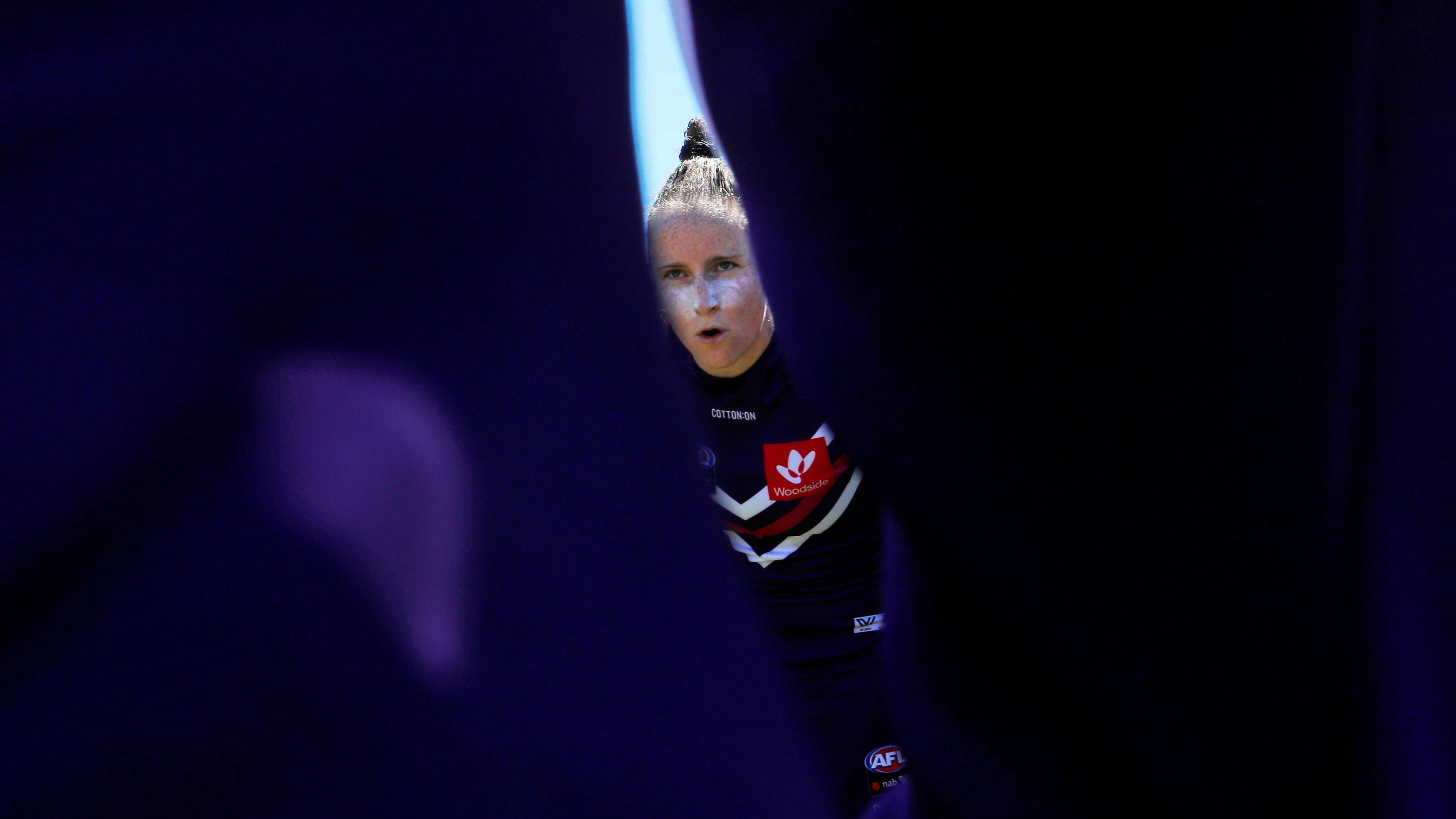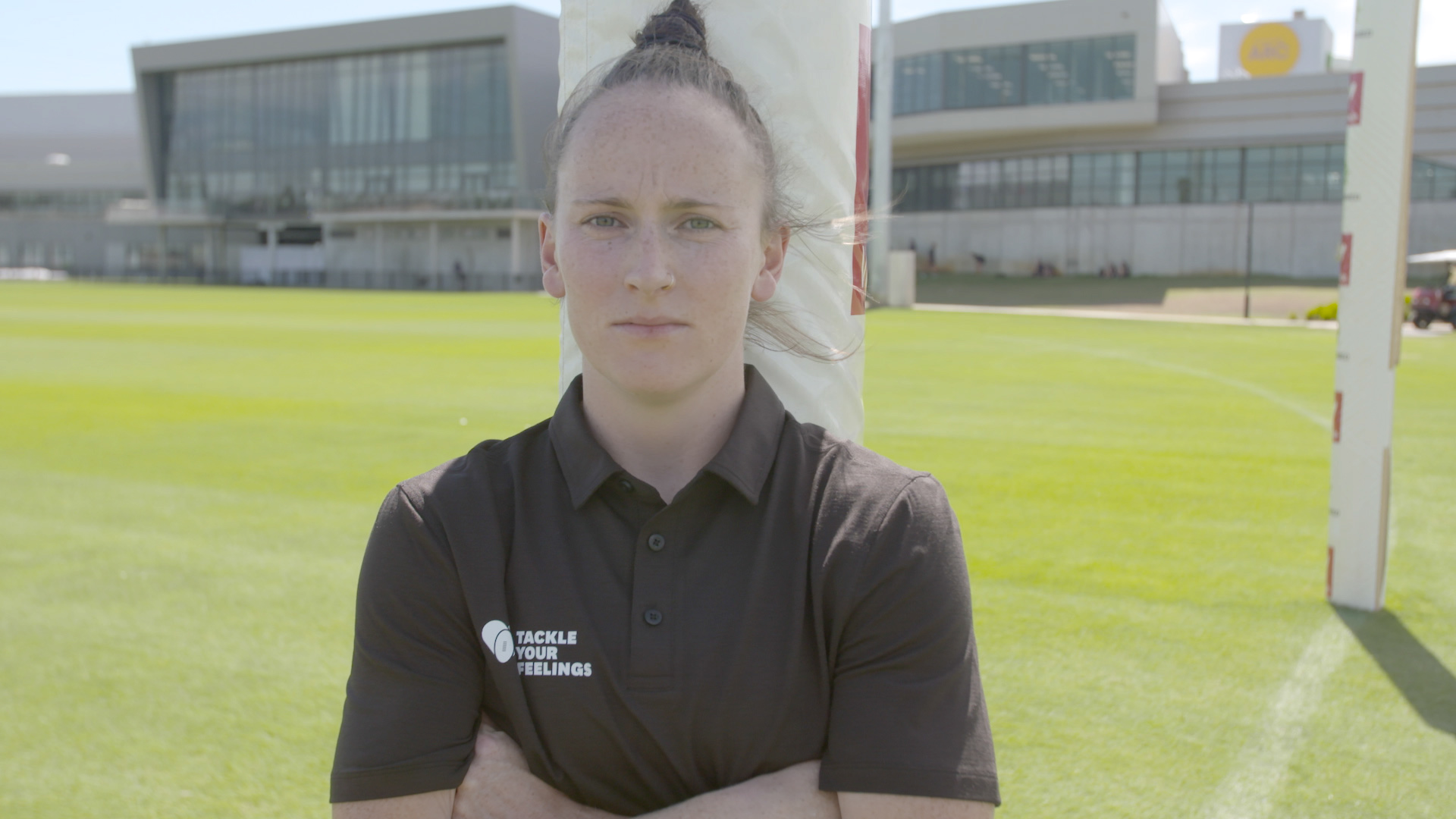Words by Kara Donnellan (Fremantle)
Kara Donnellan – Tackle Your Feelings
As with most coaches, my role goes beyond the football field and my game day duties.
I work full-time managing our community programs at Swan Districts in the WAFL and with our women’s football program – I live and breathe footy.
I’m around the football club for a significant period of my time and a positive that has come from that is I am always available to the playing group whenever they need me.
Managing our football program means looking after roughly 120 female players who are registered across our three grades: women’s senior WAFLW team, reserves and under-18s.
Prior to becoming a coach, I played with the Swan Districts team for six years and was fortunate enough to captain the club to a number of premierships.
It’s been a big change going from playing to coaching but I’ve spent time focussing on building strong relationships with my players.
I’m still learning about this domain and all of the aspects that come with being a senior coach but my number one priority is looking after the player’s mental wellbeing. If I can support them off the field, it will hopefully go a long way in ensuring they can be the best footballer and person they can be.
Part of coaching in the WAFLW means I am managing varying levels of talent from an AFLW player who is with us for the WAFLW season to aspiring AFLW player and consistent WAFLW player.
There is no one right answer when managing varying levels of talent, but at the start of the season I made it clear to the playing group that my door would always be open whenever they needed a chat.
I’m there to support whatever aspirations they have, whether that is to play AFLW or to reach milestones with the Swan Districts.
It’s important when you’re in a position as coach to manage individuals on a case-by-case basis – no one mould fits all.
I often have challenging conversations where I have to deliver feedback, direction to the playing group and manage my expectations based on the goals and aspirations that we set early in the season.
Tailoring the way I deliver these conversations begins with relationship building. It’s about getting to know your players individually and knowing what makes them tick and how you can approach certain situations.
One of my strengths is that I’ve been around the club for such a long period of time that I’ve been able to work on building relationships and developing trust within the playing group.
Delivering feedback is challenging but it’s also really important because you don’t want to overstep or understep the mark – it’s important to find the right balance.
It always been my mantra with the playing group to ensure we are working to get the best out of the team but also individuals and often hard conversations are a part of that.
Sometimes players might not like what I say but I’m always trying to help and the conversation comes as a result of me trying to help them get the best out of themselves.
I’m a pretty harsh critic of myself and I pride myself on being dedicated and committed to all aspects of my life, whether that be football, work, relationships, family and my home. They’re values that I try and instill on our playing group which helps me to build relationships with my players.

In saying that, it’s a catch-22.
I drive high standards but I’m also conscious of not impeding my playing group from reaching those heights. The ability to drive the standards on yourself and those around you to try and excel and succeed in their own goals and aspirations is really important.
But, life can get in the way.
I understand this more than most as an AFLW player myself and the challenges associated with managing your full-time job with your passion for football, which is something all community footballers experience.
I’ve been very open in having conversations with my playing group about the challenges and stresses that they may face as a result of trying to balance their life with their football commitments.
This is where two-way communication is crucial and a significant factor is being able to have important conversations.
When I know and understand what my playing group are going through, I have the ability to try and support them in any way that I possibly can.
It’s challenging managing work and football, especially at an amateur level.
When the communication lines are kept open, everyone involved is able to develop a solid understanding that there is more to life than football and teammates and coaches are able to better support each other.
For a lot of community footballers, playing the game is their release. They’re able to come down, have a run around the footy track and forget about what’s been tying them down and what’s been going on in their everyday lives but naturally, sometimes it is hard to separate those feelings and emotions.
This is where creating a safe environment is critical.
The number one part in creating a safe environment is ensuring that everyone feels comfortable to be who they are.
It’s a culture that we drive at Fremantle and at Swan Districts.
Go out for a coffee, catch up or spend time one-on-one with your teammates and colleagues because it’s really important to build those relationships.
You want to know that the person next to you has got your back, whether you’re about to put your head over the footy or you’re experiencing a challenging time.
It’s important to set a strong culture that everyone is part of building but also one where there is a sense of belonging.
When people safe, comfortable and happy is when they will have the tools to succeed.
Need Support? If you know someone who requires urgent assistance or support, please contact:
Suicide call back service: 1300 659 467
Lifeline: 13 11 14
Kids Helpline: 1800 551 800
Emergency: 000
Support for AFL Players: If you are a current or past AFL Player and would like to know more about our specialised wellbeing and mental health services please contact the AFL Players’ Association at wellbeing@aflplayers.com.au or Tel. 03-8651 4300 (Mon to Fri, 9am – 5pm).


